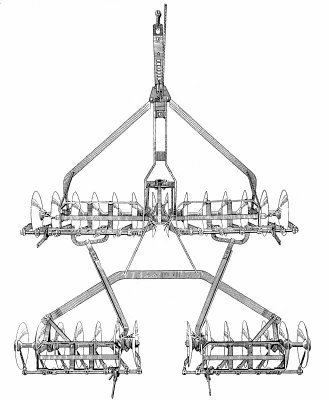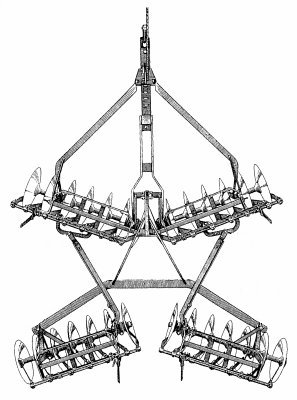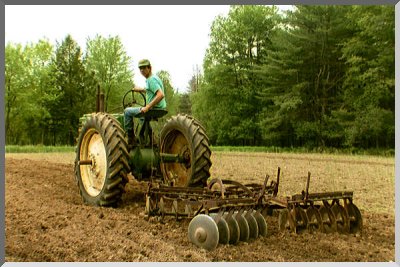The Model "JB" Tractor Disk Harrow

|
The illustration at the left shows a
top view of the John Deere
Model JB Harrow in the transport position. When it is straight like
this, it can be pulled across a lawn without damaging the turf,
as long as you don't turn any sharp corners.
THEN you would dig up the lawn! These pictures are taken from an original owners manual, dated July, 1941. The drawing below shows the harrow angled, in the cutting position. To put it in this position, you pull the rope that unlatches the sliding drawbar and you back up the tractor. This doesn't change the angle of the harrow, this just "sets" it. When you pull forward, the angle of the disk gangs changes, and it assumes its cutting position. In order to straighten out the gangs, you just pull the rope again. It is not even necessary to stop. |
|
I love to collect and read the literature that came with these pieces of equipment. Now that you have read my
explanation of how the harrow works, the following are the instructions for operation, as printed in the manual:
"To angle gangs, first place
drawbar in cocked position by
pulling trip rope and backing tractor until drawbar is fully telescoped.
With rope released, drive forward and gangs will immediately assume
full cutting angle. |

|
|
"Gangs are straightened
by pulling trip rope while moving
forward. Gangs can also be straightened by backing tractor
without pulling rope until gangs are straight.
Then pull rope and go forward. Should gangs clog up in extremely trashy conditions, they can be quickly cleared by merely backing tractor without pulling the rope. This straightens the gangs and clears the trash. When tractor goes forward again the gangs automatically assume their former cutting angle."
As I was reading
this I was reminded of all the countless instruction
sheets I have read in my life. They are always written in a
word-saving way that makes them sound stilted, like a person with a
foreign accent (where his native language doesn't use the definite
article "THE" so he sees no need for it). The person who wrote
this one, tried real hard to save words, but he occasionally forgot,
and left in a "the". I was thinking, I'm so glad we no longer
have to talk this way! But we still DO, don't we? I was wrong;
things today are much worse! We have instructions translated
from Japanese, by a Japanese
speaking person! No offense to anybody, but I understand that
Japanese sentence structure is the reverse of ours, so that's
why all the translations come out Bass-ackwards! If I were to
sell a product in a foreign country, say Poland, where I know a
little bit of the language, I would have a Polish-speaking person
proofread my writing, and correct my mistakes, before it was printed! |
|

|
Just a few more passes and the entire
asparagus patch is again free of weeds. I usually do this
in the fall, just in case it turns out to be too muddy in the spring.
Last year it was too muddy in the fall!
|
| Go back one page. | |
|
| Send Green Email to Gene |
|
| Go to Gene's Tractor Page |